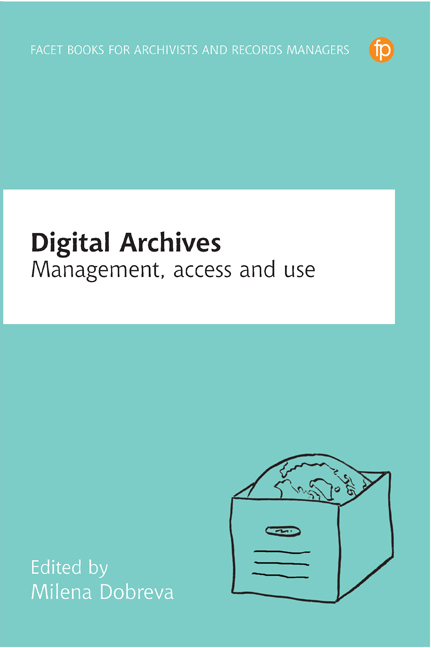Book contents
- Frontmatter
- Dedication
- Contents
- List of Figures and Tables
- Abbreviations
- Foreword
- Preface: Digital archives: management, use and access participatory approaches in archives
- Acknowledgements
- Notes on contributors
- PART I DRIVERS FOR MODERN DIGITAL ARCHIVES
- PART II CASE STUDIES
- 7 Research data archives: current data management and data audit practices
- 8 Access restrictions
- 9 Citizen science: two case studies in oral history research
- Afterword
- Index
8 - Access restrictions
from PART II - CASE STUDIES
Published online by Cambridge University Press: 02 October 2019
- Frontmatter
- Dedication
- Contents
- List of Figures and Tables
- Abbreviations
- Foreword
- Preface: Digital archives: management, use and access participatory approaches in archives
- Acknowledgements
- Notes on contributors
- PART I DRIVERS FOR MODERN DIGITAL ARCHIVES
- PART II CASE STUDIES
- 7 Research data archives: current data management and data audit practices
- 8 Access restrictions
- 9 Citizen science: two case studies in oral history research
- Afterword
- Index
Summary
Introduction
Traditionally, archives have been characterised by restrictions on access for two main reasons: because of the nature of the type of information represented by archival records, and the need to protect unique artefacts. However, all the settings have changed in today's digital environment, which necessitates questioning and re-evaluating our approaches to access. Networked technologies have substantially lowered barriers and put archives in the global information landscape. This process is not always straightforward – the complexity of digitisation arrangements, and in particular agreements for joint digitisation initiatives of archives with external partners, contribute to make artefacts available in digital form, but might be bound with access restrictions as highlighted by Trudy Huskamp Peterson in Chapter 2. While these are interesting phenomena, the aim of our chapter is to highlight the perspectives on access restrictions that reflect the nature of the archival materials and their use.
This chapter begins by exploring traditional views of access provision, and then reflects on the disjuncture between highly publicised freedom of information initiatives such as WikiLeaks and current professional practice. By way of contrast, the need to recognise cultural imperatives to restrict access is discussed, using the example of New Zealand Māori perspectives. This example also illustrates the dimension of access which contributes to ‘giving a voice’ to minorities and in some cases puts access in the centre of human rights movements. The chapter concludes by calling for a much more nuanced and culturally appropriate view of access rights and restrictions.
Access – of lesser importance to archivists?
It can be argued that access considerations may be accorded the lowest priority by archivists, as is illustrated by this summary of the skills needed by an archivist taken from the Australian Society of Archivists’ website. Archivists need to know:
• what records and archives are, and how they have evolved in modern society
• how to collect archives and how to assess the long-term value of records
• how to look after archives
• how to understand legal issues and responsibilities including copyright, confidentiality, privacy and access
• how to arrange and describe archives for management control and to make them available
• how to provide services for those wishing to make use of the archives (Australian Society of Archivists, 2013).
- Type
- Chapter
- Information
- Digital ArchivesManagement, use and access, pp. 157 - 166Publisher: FacetPrint publication year: 2018



